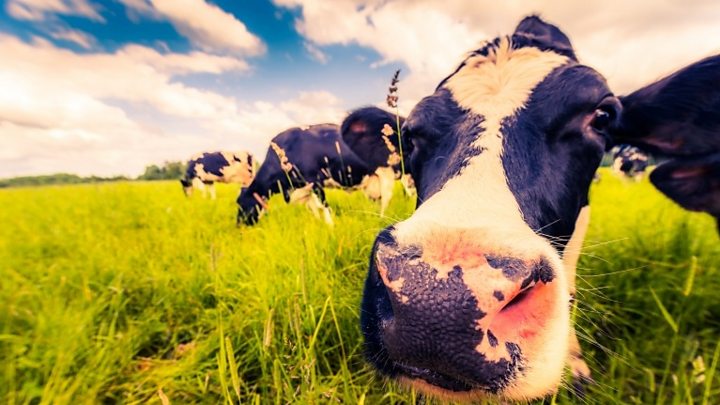Agriculture bill: MPs set to reject food standards changes

A parliamentary tussle over post-Brexit plans for food standards is set to resume.
MPs are set to decide whether to accept or reject changes to legislation, such as whether to require imports after 1 January to match UK legal standards.
Campaigners warn the UK may have to accept lower standards to secure a future US trade deal and that cheap imports could damage domestic farmers.
But ministers insist this is not what they want and safeguards are in place.
They say EU rules banning imports of chlorine-washed chicken and other products will be automatically carried over once the post-Brexit transition period ends on 31 December.
The Agriculture Bill - which is designed to prepare the farming industry for life once the UK no longer has to follow EU laws and rules - returns to the Commons on Monday.
- Soil at heart of farm grant revolution
- Farmers welcome advisory body on fair trade deals
- The week ahead in Parliament
The government suffered multiple defeats during the bill's passage through the House of Lords.
Commons votes
Peers made a number of changes, including one demanding the government agrees rules making it impossible for the United States or other countries to export so-called chlorinated chicken or beef fattened with hormones.
They want it to be explicitly written into law so no food imported into the UK can fall below British standards on animal welfare and consumer protection.

MPs will now decide in the coming days whether to overturn this and other changes to the bill, including calls for tougher powers for the newly constituted Trade and Agricultural Commission to scrutinise future trade deals and to advise Parliament on their implications for food standards.
It is unclear, at this stage, which of the Lords amendments will be voted on, amid a dispute over the terms of the "money resolution" of the Bill - which allows for the expenditure of public money on new laws.
While the government, which has an 80-strong majority, is expected to win any votes that do take place, there could be a rebellion unless it agrees further concessions.
Sir Roger Gale and George Freeman are among Tory MPs to say they will vote for the food standards amendment to remain in the bill, saying it is in line with his party's 2019 manifesto pledge to maintain welfare standards.
Neil Parish, the Conservative chair of the Commons Environment, Food and Rural Affairs Select Committee, has said ditching it would leave British farmers at risk of being "under cut" in the future.
Labour's shadow environment secretary Luke Pollard said the opposition would back the "sensible protections" added to the bill by peers, which he said were in the interests of British farmers.
The BBC's parliamentary correspondent Mark D'Arcy said he expected the Bill to be sent back to peers minus most of the additions as part of a process known as "ping pong", in what could become a "test of mettle" for the Lords.
'Say it, mean it'
Ministers have repeatedly said there will be no undermining of food standards in any future trade deal with the US, given the details of any agreement would have to be explicitly agreed by Parliament.
But critics, including the chef and food health campaigner Jamie Oliver, say the fact existing safeguards will not be enshrined in primary legislation will make it easier for ministers to change them later if they need to be flexible.
He told the BBC recently that he feared the impact on British farmers of "an influx of lower standard products".
The National Farmers' Union supports the Lords amendment on minimum food standards but wants ministers to go further and ensure Parliament is properly able to scrutinise the "small print" of future trade deals.
"There has been a commitment from government, this is about the how," its president Minette Batters told BBC Radio 4's Today.
She said British farmers need to know they were competing on a level-playing field.
"The point is that there are no laws in the US on how you keep your animals," she added.
"If you don't have those legislations in other countries and you have them here, if you under-cut our producers, you simply undermine the marketplace and put ours out of business.
"So it is about putting it in writing. Say it, mean it, put it down in legislation."